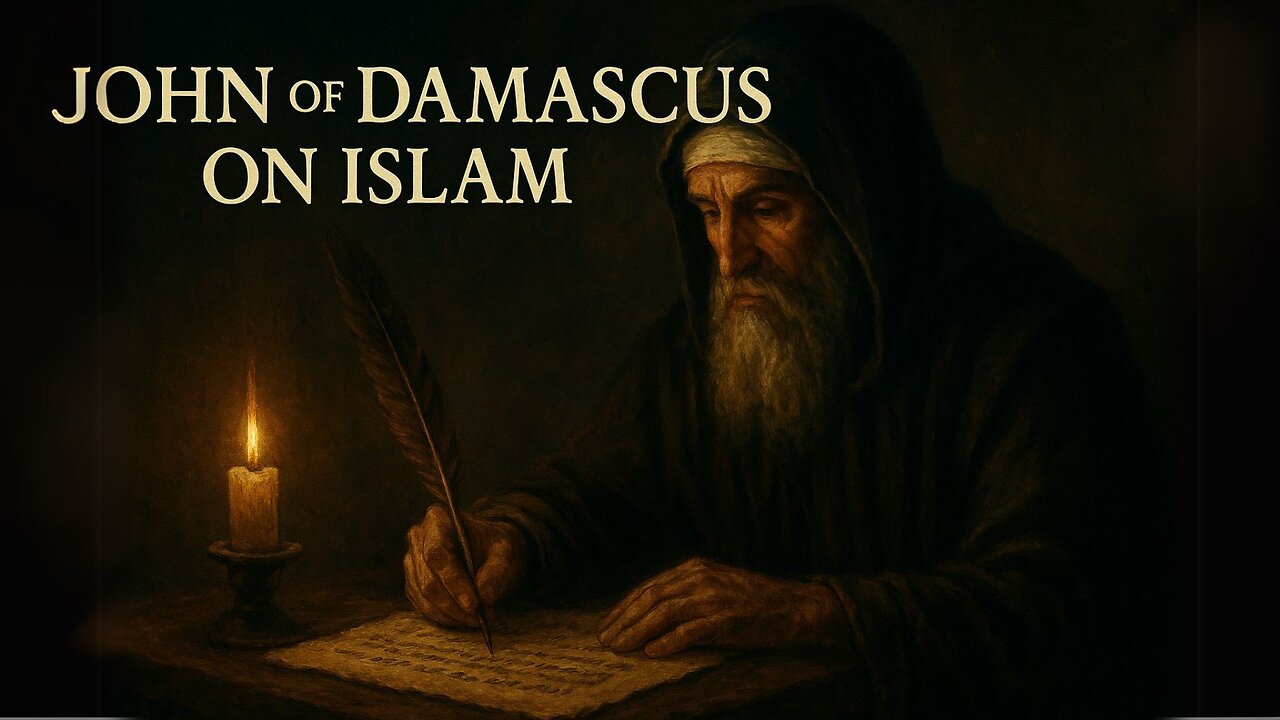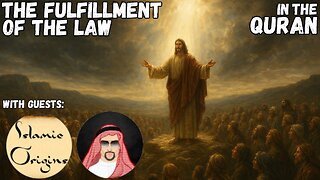Premium Only Content

What Did John of Damascus Really Say About Islam?
Discover the fascinating insights of John of Damascus in this AI-generated video, featuring a reading from his monumental work, The Fount of Knowledge, specifically the section where he discusses the Ishmaelites. Saint John of Damascus, also known as John Damascene (c. 675–749 CE), was a revered Christian theologian, monk, and scholar of the early medieval period.
Born in Damascus under Umayyad rule, he is celebrated as one of the most influential Church Fathers of the Eastern Orthodox Church and a key figure in Christian theology. His works bridged Greek, Christian, and Islamic intellectual traditions, making him a pivotal voice in the religious and cultural landscape of the 8th century.
The Fount of Knowledge (or Fons Scientiae in Latin) is John of Damascus’s magnum opus, a comprehensive theological and philosophical treatise that systematizes Christian doctrine. Written in Greek, it is divided into three parts: the Philosophical Chapters (on logic and philosophy), the On Heresies (a catalogue of Christian heresies), and the Exposition of the Orthodox Faith (a detailed articulation of Christian beliefs). The section highlighted in this video comes from On Heresies, where John addresses the beliefs of the Ishmaelites, a term he uses to describe the followers of a nascent religious movement that scholars identify as early Islam.
What makes John’s account particularly intriguing is his unique perspective on the Ishmaelites, a term rooted in biblical tradition, referring to the descendants of Ishmael, the son of Abraham. Notably, John does not use the term “Islam” or “Muslims,” which were not yet standardized in his time. His descriptions of the Ishmaelites are striking because they seem to depict a religious movement that differs in significant ways from the Islam we recognize today.
Writing in the early 8th century, John was a contemporary of the Umayyad Caliphate, and his observations may reflect an early stage of Islamic development, possibly before the religion’s doctrines and practices were fully codified. His account raises questions about the evolution of Islamic theology and its interactions with neighboring Christian and Jewish communities in the Near East.
This video brings John of Damascus’s words to life, offering viewers a window into the religious and intellectual world of the early medieval Middle East. By exploring his references to the Ishmaelites, we gain insight into how early Christians perceived the emerging faith of Islam and how cultural and theological boundaries were navigated in a diverse, multi-religious society. The Fount of Knowledge remains a cornerstone of Christian apologetics and a valuable historical source for understanding the interplay of Christianity, Islam, and philosophy in the Byzantine and early Islamic periods.
Join us in this exploration of John of Damascus, The Fount of Knowledge, and his enigmatic references to the Ishmaelites.
-
 8:01
8:01
J. Corman Kane
5 days agoThe Quran's Hidden Connection to Jesus REVEALED
12 -
 LIVE
LIVE
megimu32
47 minutes agoON THE SUBJECT: The Movies That Made Millennials — And the Ones That Missed 🎥
129 watching -
 UPCOMING
UPCOMING
Anthony Rogers
1 day agoEpisode 389 - Tommy Gunn
58 -
 18:13
18:13
T-SPLY
3 hours agoChicago Mayor Accuses ICE Of Human Rights Violations!
14110 -
 1:09:47
1:09:47
iCkEdMeL
1 hour ago $2.16 earned🔴 Redwood City Standoff Erupts in Gunfire | Police Shooting Update
5.96K2 -
 13:10:31
13:10:31
LFA TV
23 hours agoLIVE & BREAKING NEWS! | TUESDAY 11/11/25
180K34 -
 30:53
30:53
BonginoReport
8 hours agoMonica Kelsey: The Woman Who Is Saving Countless Babies - Nightly Scroll w/ Hayley Caronia (Ep.175)
90.8K17 -
 1:08:36
1:08:36
Kim Iversen
5 hours agoFrom Head Chopping to The Oval Office: Who is Al-Sharaa?
96.6K76 -
 DVR
DVR
The Bold Lib
3 hours agoBOLDCHAT: The Intolerant Left | Veterans Day w/ANGELA BELCAMINO
12.2K1 -
 DVR
DVR
Quite Frankly
6 hours agoVeterans Day Lies, Legalized Betting, And More | Sal & J Gulinello 11/11/25
17.5K6